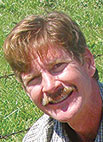
First-generation farmer works to expand product offerings
VILONIA, ARK. – Just beyond the city of Vilonia, Ark., lies Gray Rose Dairy. A small family-run farm buzzes with activity in a quiet corner of Arkansas.
Every family member has a role, from the youngest child to the parents who juggle their farm duties alongside full-time jobs as mail carriers. The farm, a modest 6-acre plot, is a testament to hard work, determination, and pursuing a dream.
Michael Gray has nurtured his farm into a shining example of rural serenity and agricultural charm. With a background far from farming, growing up with only an acre of land, Michael is entirely self-taught, mastering the art of agriculture since buying his first tractor in 2020.
As a first-generation farmer, Michael has successfully begun operating a goat dairy system with plans for further growth.
Michael’s motivation stems from his desire to maximize his land and provide his children with a hands-on learning environment.
“We moved and finally had space. My children are outside getting dirty, doing farm work and playing outside. They may not appreciate it much now, but I think they will later,” Michael said.
The farm operates with a herd of eight Alpine goats, each contributing to the daily rhythm in this small family-run enterprise. The goats are milked in a small barn twice a day equipped with stands, ensuring a steady supply of milk for family use and local sales.

The breeding process is carefully timed, with goats bred in the fall to ensure kids are born in the spring. This timing aligns with the natural cycle and helps manage the herd’s health and productivity. The drying-off process begins in the hot summer when milk production naturally declines. During this period, the goats’ milk production is gradually reduced to prepare them for the next breeding cycle.
In addition to their goat herd, the family is expanding their dairy operations to include cow production. Currently, they have two young cows, a Holstein and a Jersey, both yearlings poised to enter milk production by the following season.
“The goats have a small milk barn now, but I will try to build a bigger one for the cows. It takes time and money, but it’s on a timely and seasonal basis,” Michael said.
This barn will feature a more spacious and comfortable setup with fans to keep the cows cool during milking. Once the cows begin producing milk, the family intends to diversify their dairy products, offering cow and goat milk and exploring the production of cheese, butter, and other dairy items.
Amidst the well-managed flurry of activity, the family has a system. Tasks are divided among the children and adults, with everyone pitching in to ensure the farm runs smoothly.
The farm’s day-to-day operations are a genuine team effort. Michael’s children can take on milking duties during the summer when the heat forces the family to cut back on their milking schedule. The children also feed the animals in the evenings, while Michael uses tractors to take hay out when necessary.
Managing the herd involves meticulous care and planning. The family breeds their goats in the fall to ensure the kids are born in the spring, aligning with the natural cycle of the goats. This strategic timing helps them manage the herd’s health and productivity, especially during the sweltering summer months when milk production drops.
Once they have a surplus of milk, the family plans to diversify into products like cheese, butter and soap. This diversification maximizes the farm’s potential and provides a broader range of products for their local market.
“Once we get a little more volume, we plan to start taking it to the farmers market,” Michael explained.
Looking ahead, they plan to increase their production capacity, particularly with the cows, to have enough surplus to explore new products and expand their market reach.
“Once I stop expanding my herd and start selling the kids, I’ll have more surplus milk to experiment with cheese-making and sell cow milk. This would free up some of our goat milk to make soap or cheese,” Michael said.
While Gray Rose Dairy continues expanding its product offerings and operations, this growth is challenging. As Michael diversifies into cow milk and various goat products, he faces obstacles such as equipment costs, managing increased workloads, and navigating the complexities of market demand. Additionally, Michael has encountered unexpected setbacks, including theft of several goats over the years.
“We’ve had two different years where we’ve had one stolen,” Michael laments.
Michael has taught himself everything necessary to ensure the health and well-being of his livestock. Taking a hands-on approach to managing the farm, personally handling all veterinary care and kidding responsibilities.
Despite setbacks, the family has persevered, hand-raising their goats and maintaining a friendly and productive herd.
Michael has built his farming knowledge and skills from the ground up, bringing a fresh perspective to agriculture compared to those who grew up in farming environments
The family’s journey has been constant learning and adaptation, from learning how to maintain tractors to understanding animal care.
They aim to create a sustainable lifestyle, teaching their children the value of hard work and self-sufficiency.
“I want us to have something to show for what we have,” Michael said, emphasizing the importance of using their land to its fullest potential.







